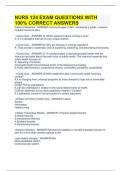NURS 124 EXAM QUESTIONS WITH
100% CORRECT ANSWERS
Father of Medicare - ANSWER-Tommy Douglas (1947)- introduced a public, universal
hospital insurance plan.
.⭐Quick Quiz - ANSWER-Q: Which statement about nursing is true?
A: It is a discipline that has its own unique science
.⭐Quick Quiz - ANSWER-Q: Why are theories in nursing important?
A: They provide a systematic view of explaining, predicting, and describing phenomena.
.⭐Quick Quiz - ANSWER-Q. A nursing student is discussing public health with her
instructor and asks about the main focus of public health. The instructor responds that
public health focuses on:
A. Reporting, Promotion
Q.Canada Health Act embraced which of the following 5 principles
A.Public administration, comprehensiveness, universality, portability, accessibility
.⭐Quick Quiz - ANSWER-Q.Which statement about community health nursing is
correct?
A.It is changing from universal programs to those directed to high-risk or vulnerable
groups
Q.High Priority populations:
A.Can be understood in relation to the social determinants of health
Q.Which statement is true about population health in Canada?
A.It addresses concerns that are present in certain population
.4 Pillars of Primary Health Care - ANSWER-Teams
Access
Information
Healthy living
.5 Major Theoretical Models - ANSWER-1.Practice-based theories
2.Needs theories
3.Interactionist theories
4.Systems theories
5.Simultaneity theories
.Advance directive - ANSWER-Mechanism enabling a mentally competent person to
plan for a time when mental capacity is lost
.Age related changes - ANSWER-Skin
Musculoskeletal system
Cardiovascular system
,Respiratory system
Renal system
Immune system
Endocrine system
Pancreas and thyroid
Reproductive system
Gastrointestinal system
Neurological system
.Attributes of Clinical Judgment - ANSWER-1.Involves a holistic view of patient situation
2.Has a process orientation
3.Requires reasoning and the interpretation of data
4.Ethical comportment
.Barriers to Primary Health Care - ANSWER-Individual-level barriers
Practice-level barriers
System-level barriers
.Betty Neuman - ANSWER-→ Systems theory- 1972
→ Key concepts:
1.The nurse is concerned all the variable affecting an individual's response to stressors
2.Stressors
3.Interventions: Primary, secondary, tertiary
.Calgary Family Assessment Model (CFAM) - ANSWER-A relational, strengths focused
practice model that guides nurses in comprehensive family assessments- focuses on
three major categories of family life- structural assessment, developmental assessment,
functional assessment
.Calgary Family Intervention Model - ANSWER-A companion to the CFAM that guides
nursing in implementing interventions
The CFIM recommends many relational nursing practices that promote family health
and functioning, including asking- interventive questions, offering commendations,
providing information, validating emotional responses, encouraging illness narratives,
supporting family caregivers, encouraging respite
.Canada Health Act 1984
SHELLEY SAID WAS IMPORTANT - ANSWER-Extra billing was a threat to universality
and access of medical insurance program
Federal gov. response was to enact the Canada Health Act in 1984
5 principles of Primary Health Care:
1.Public administration
2.Comprehensiveness
3.Universality
4.Portability
5.Accessibility
, Provinces may ignore principles but may have federal dollars withheld
.Care coordination - ANSWER-Is the deliberate synchronization of activities and
information to improve health outcomes by ensuring that care recipients and families
needs and preferences for healthcare and community services are met over time.
.Categories of Errors - ANSWER-Diagnostic- the result of a delay in diagnosis, failure to
employ indicated tests, use of outmoded tests, or failure to act on results of monitoring
or testing
Treatment- occur in the performance of an operation, procedure or test, in administering
a treatment, in the dose or method of administering a drug or in avoidable delay in
treatment or in responding to an abnormal test
Preventative- occur when there are failures to provide prophylactic treatment and
inadequate monitoring or follow up of treatment
Communication- failure (meaning a lack of communication or a lack of clarity in
communication) can lead to many types of errors
.Causes of Delirium - ANSWER-Medications-40%
Infectious process
Dehydration and electrolyte imbalance
Metabolic imbalances
Hypoxia
.Clinical Judgment - ANSWER-Is an interpretation or conclusion about a patient's
needs, concerns, or health problems, and/or the decision to take action (or not), use or
modify standard approaches, or improvise new ones as deemed appropriate by the
patient's response.
3 approaches
1.Standards-based approach- provides clear-cut guidance and standardized
approaches to patient care- best practices will lead to the best treatment
2.Evidence-based practice and clinical judgment- combines best available scientific
evidence with best available patient and practitioner experimental evidence, interested
in optimal outcomes
3.Interpretivist perspective- understands nursing care is not linear- considers multiple
complex variables for clinical reasoning
.Clinical Reasoning - ANSWER-For nursing students to manage complex critical
scenarios effectively it is essential to understand the process and steps of clinical
reasoning
Consider the patient situation- patient age, diagnosis, signs/symptoms
Collect cues/information- review current info such as handover or end of shift report,
patient history, patient charts, results of diagnostic testing results of labs, assessments
previously done. Gather new info by completing your patient assessment, recall
knowledge that you learned regarding A+P, pathopharmacology, health assessment,
context of care, culture, ethics, etc.




